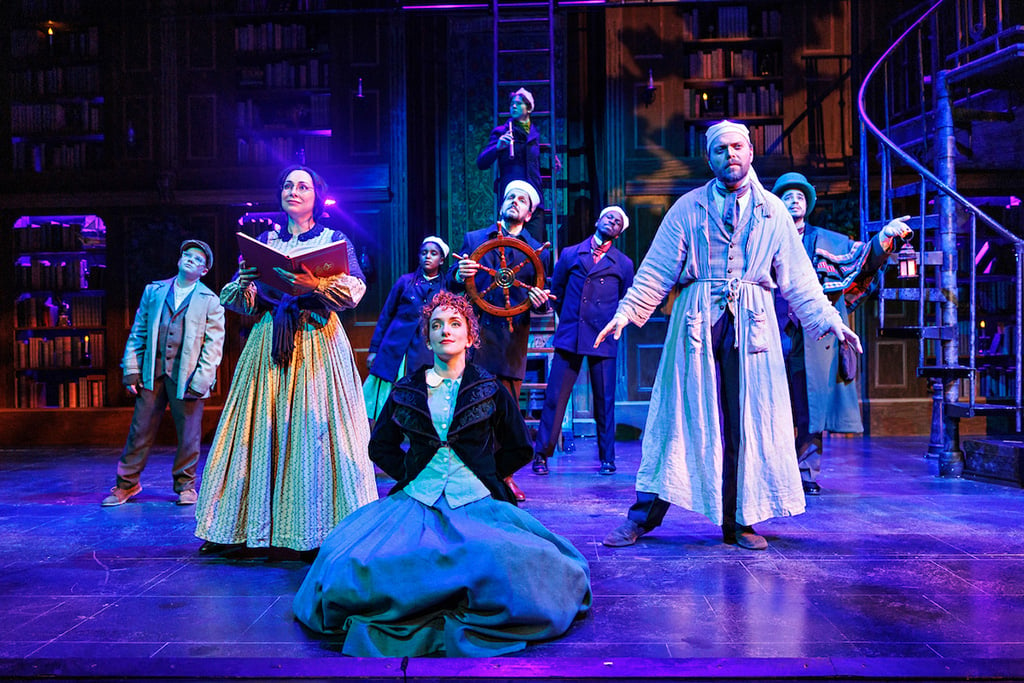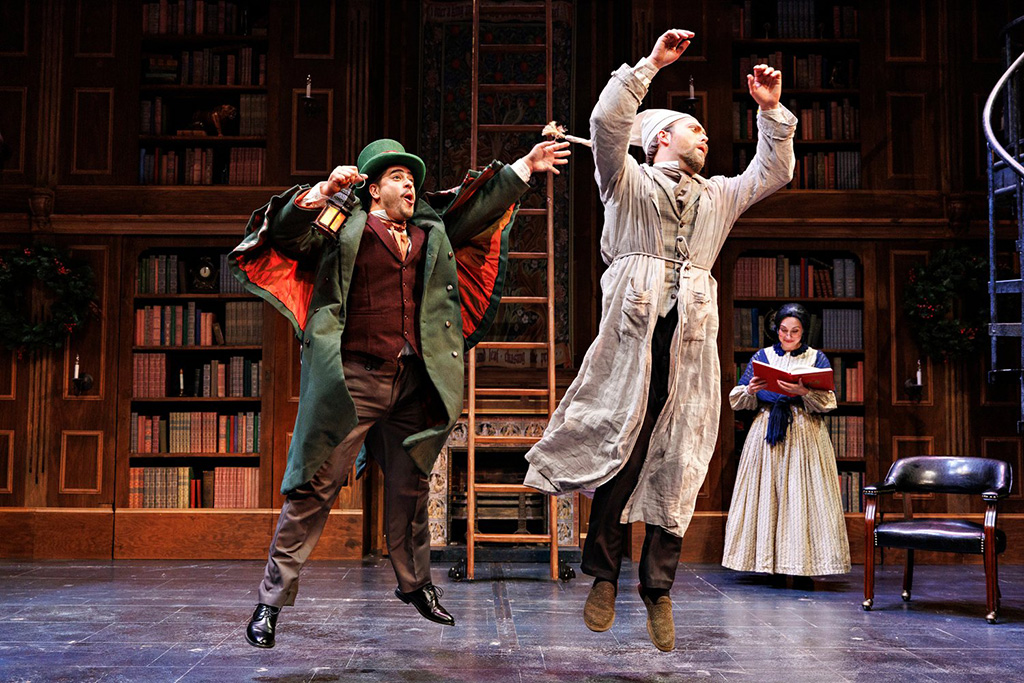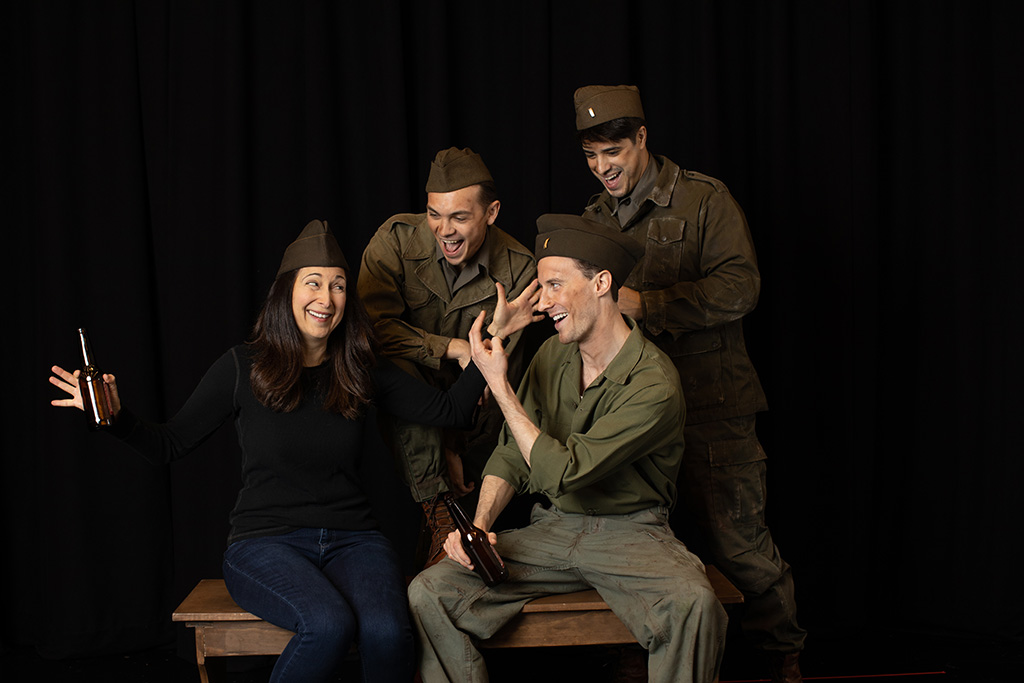 The production of “A Christmas Carol” currently on the T2 stage is the fourth adaptation of the story on Amy Herzberg’s resume. Her first was written nearly 30 years ago and was a collaboration with the Fayetteville branch of the Salvation Army. (Wesley Hitt)
The production of “A Christmas Carol” currently on the T2 stage is the fourth adaptation of the story on Amy Herzberg’s resume. Her first was written nearly 30 years ago and was a collaboration with the Fayetteville branch of the Salvation Army. (Wesley Hitt)TheatreSquared co-founder, associate artistic director, and University of Arkansas Distinguished Professor and head of the MFA acting program Amy Herzberg has written four stage adaptations of the Charles Dickens classic “A Christmas Carol” — either solo or in partnership with her husband, playwright Robert Ford.
The adaptation that’s running now on the T2 stage is a feast for the senses, making the most of the original’s magic, mystery, and sparkle. It has a towering, intricately detailed set by Martin Andrew that’s immaculately dressed by properties lead Sophia deGuzman, props director Brodie Jasch and props assistant Emily Johnson; bright and colorful period costumes by Ruby Kemph; a spooky-turned-celebratory lighting design by Megan Reilly; and a rousing holiday music and portentous sound effect score by Tommy Rosati. Associate director Bryce Kemph effortlessly wrangles a corps of 14 actors to play an even larger cast of characters — some actors have as many as eight roles to play — and once you realize how many costume changes the talented cast is making (assisted by a crack backstage team), that job seems even more daunting.

“A Christmas Carol”
Where: TheatreSquared, Fayetteville
When: Through Dec. 24
Cost: $25-$60 in person, $25-$35 digital stream
Tickets: 479-777-7477 or theatre2.org
Which is not to say it relies on flash over storytelling: Herzberg and co-writer Ford have also doubled-up on the meat of Dickens’ story with the framing of the play. A young boy has been seemingly abandoned in London’s public library on Christmas Eve. It’s closing time, and the lone librarian trying to close up is unsure how to handle the situation. Flustered, she pulls a newly published version of Charles Dickens’ classic from the shelves and begins reading it aloud, and, eventually, the boy joins in to tell the tale. As they do, there are brief, touching scenes in which the audience learns more about the boy’s difficult life. In this way, Herzberg and Ford effortlessly emphasize the concerns that are ever-present in Dickens’ work—child exploitation and poverty, to name but a few — and deliver an emotional ending that will leave audiences with a Christmas ornament-sized lump in their throats.
“It has several themes that I’m really taken with,” Herzberg said when asked what makes this a particular story she can’t let go of. ”One is the idea of not ever giving up on someone, that everyone has good in them — you’ve just got to look for it, and you’ve got to give that a chance and a hope. I think that’s terrific. I think it’s all too easy to just write people off instead of looking for how we can support and uplift people rather than tear them down or give up on them — that seems really important to me.
“I guess the biggest thing is how much I love the idea of redemption. We want people to pull themselves up by their own bootstraps, but we have to be participants in it. That feels really big to me.”
Consider the first adaptation of “Carol” that Herzberg wrote, nearly 25 years ago: Commissioned by Ozark Stageworks, a professional theater operating in Fayetteville in the 1980s and 1990s, the production was a collaboration with the Fayetteville branch of the Salvation Army. The script made even more pointed connections between Dickens’ traditional themes and newly devised material incorporated into his story. The process included a months-long project of interviewing people who were unhoused and turning their stories into heartfelt monologues that sought to humanize an issue from which too many look away.
“These interviews really have stuck with me, they were so fascinating,” Herzberg says. “To hear people’s stories about the difficulties that they got in and how we all need people who are looking out for us and that kind of generosity.
“I will say that I have never thought about homelessness the same since then.”
Once you talk to Herzberg for any length of time, you see the thread of Dickensian motifs like redemption, empathy, and uplifting others winding through her life from the beginning, perhaps because her outsized creativity and talent made her feel like an outsider from an early age. When she started piano lessons at the tender age of 5, Herzberg’s innate, prodigy-level talent was immediately evident. It wasn’t the only area of the arts in which she excelled. As anyone who grew up with an abundance of creativity knows, that unusual talent would set the stage for a childhood where the only way to escape middle school ridicule was to conform to rigid norms — which, defiantly, Herzberg chose not to do.
“I remember this time in seventh grade, we had to do a report on a historical period,” she said. She chose to cover Patrick Henry’s famous 1775 speech. “Oh my God, when I think about it now — it’s all too much. All too, too much. I had made what I thought was a noose, had wrapped it around my sister’s [styrofoam head] that held her little hairpiece, and put it all under a blanket. And at that part of the speech, I yanked the blanket off and waved the stick with the head on it all over the room while yelling ‘Give me liberty, or give me death!’ There was an audible, horrified gasp, but I was just like, ‘This is great.’”
 “A Christmas Carol” is on stage through Dec. 24 at TheatreSquared in Fayetteville. (Wesley Hitt)
“A Christmas Carol” is on stage through Dec. 24 at TheatreSquared in Fayetteville. (Wesley Hitt)High school was a better fit for her when she found her crowd — theater kids. While musically gifted, she yearned for the communal aspects of live theater, and though she started out with music as her undergraduate degree, it was clear theater had a monopoly on her heart.
“Now, when I look at it, the idea that I was going to be in music is so ridiculous,” she mused. “I saw everything theatrically.”
She made her career choice official by attending the California Institute of the Arts to earn her graduate degree, quickly followed by stints in the companies of the prestigious La Jolla Playhouse and the well-respected San Diego Rep. She was working at the latter when a friend suggested she apply for a teaching position at Trinity University in Texas. The one-year appointment was supposed to be a temporary job change — while she had considered teaching in her 40s, she had no intention of doing anything other than acting until then. When she first showed up at the Trinity University theater administration building, she was consumed with doubt at the sight of her name on an office door. She turned to her father, who had driven her from California to Texas, and told him to go get the car.
“He said, ‘What?’” she remembers. “I said, ‘We’re leaving. I cannot have an office. I seriously think I am walking away from this job.’ He said, ‘You are absolutely not walking away from this job.’”
Two weeks later, she felt like she had been struck with a bolt of lightning when she discovered she loved teaching.
“I thought, ‘Why did no one share this with me? Why did they keep this under wraps?” she remembers. “It was wonderful. And I loved my students. And I loved teaching.”
“She stood out because she was young and energetic and inspired and funny,” remembers actor Rebecca Harris, who was one of Herzberg’s first students. Harris is an accomplished stage, screen and television actress whose credits include “How to Lose a Guy in 10 Days”, “The Good Wife”, and “Outsiders”, and was the first actor to ever perform in a TheatreSquared show. “She taught us how to create work and get inside plays and characters through a variety of avenues: music and movement and mask and a lot of text analysis. She pushed us to be rigorous in our work. I recall during a presentation for a scene study class her teaching us that nothing could ‘stand in’ for something else. Someone had propped up a set couch with a stack of books, and she said, that’s fine, but you can’t pretend that it isn’t there. Use it. That has to be your character’s reality. There has to be a reason for the broken couch and the books even if it is meant to be a fancy apartment. It served to really force me to connect with the environment, whatever that is.”
After a year, Herzberg found herself applying to colleges and universities across the country. The University of Arkansas offered her a job, and, again, she assumed it would be temporary. For someone who had spent the last five years or so in California, Arkansas seemed rural and sleepy.
But the University of Arkansas had other plans for her.
“[UA Department of Theatre Chairman] Kent Brown looked at me in this odd way and said, ‘We’re not worried about that.’”
As self-assured as Herzberg was at this stage of her life, it was one point on which Brown knew better. Within a year, Herzberg was charmed by both Fayetteville and her position at the UA. The drama department at that time was filled with highly esteemed educators with glowing resumes and powerful reputations, but Herzberg was just a few years older than the theater students she was teaching — and she was a working actor. Her audition classes were based on her own recent experience, and her students benefited from her savvy audition methods. She also started a musical theater class that had a wait list every semester. She was immediately a popular figure in the department, her office constantly filled with students for whom she always seemed to have time.
 “A Christmas Carol” is on stage through Dec. 24 at TheatreSquared in Fayetteville. (Wesley Hitt)
“A Christmas Carol” is on stage through Dec. 24 at TheatreSquared in Fayetteville. (Wesley Hitt)As a director, she soon became known for choosing edgier fare, works that were lesser known and ripe for interpretation, and that had plenty of heart and soul.
“Amy’s show choices are always fresh and exciting, often taking you to places where you’ve never been,” said Justin Fletcher, a UA alumnus who served as artistic/executive director for Defiant Theatre in Chicago and in the same position for the Chicago Department of Cultural Affairs’ Storefront Theater. “One of the best theater experiences I have ever had was her production of ‘The Cradle Will Rock’ during my undergraduate years. Preparing for it meant listening to the 1964 revival of the 1937 ‘play in music’ and digging in not only to The Great Depression and the labor movement, but also seminal institutions like the Federal Theatre Project and the Mercury Theatre.
“Amy always challenges you to use as much of your intellect and your empathy in your work as you can while expanding your worldview in the process. The material she puts in front of you is one of the main ways that she throws that gauntlet down.”
And, again, echoes of those themes of empathy and redemption can be found in her former students’ descriptions of her socio-emotional skills as a teacher. To them, she was always available as a soft landing for anyone who was struggling.
“Amy demands that people are professional, of course, but she also understands that people have complicated lives,” says Harris. “Those lives make them good actors, but those lives also require care and maintenance. She was always delighted by and was supportive of my relationship with my mom.”
“She has such love and commitment to the work she does and that love and commitment is also shown to her students,” says Craig Brooks, a former student and, today, an executive producer/showrunner working in Hollywood. “She cares so much. That care and commitment to her craft and her passion for theater made me want to work harder, prepare more for auditions. I wanted to be in the shows she directed so that I could learn from her and feel that warmth and care, too.”
Brooks is one of many of Herzberg’s former students working professionally in the world of arts and entertainment that credit her as one of the primary reasons they’ve been successful.
“I think that when Amy gave her approval over something — whether a song performance or monologue — it made me think that maybe I could really do something in entertainment,” says Brooks.
“One thing I’ll always remember is her getting my confidence up to audition for a musical, even though I do not have a great singing voice,” said actor, comedian, and best-selling author Sarah Colonna, who has multiple hit television shows and movies on her resume. “She taught me to use my personality to balance out what I felt was ‘lacking’ in my voice…and although I still have a terrible singing voice, that teaching style helped to break me out of my shell on stage, and now I have a very successful stand-up career.”
“When I booked my first Broadway show 12 years after graduating from the University of Arkansas, Amy was the first person I called,” said Rob Sutton, a New York-based stage actor who has performed on Broadway and off-Broadway and who has returned to Fayetteville numerous times to perform at TheatreSquared. “Amy was always at the top of my ‘Thank yous” if I ever won a Tony. She’s the reason I believed I could do it.”
 Amy Herzberg (left) in the TheatreSquared production of “My Father’s War” (Wesley Hitt)
Amy Herzberg (left) in the TheatreSquared production of “My Father’s War” (Wesley Hitt)Herzberg carries a full teaching schedule, is head of the MFA acting program, and has directed nearly 40 productions since she started at the University in 1989. Yet somehow, she found time to co-found TheatreSquared, which moved into its brand new, $31 million theater complex in 2019. She serves as associate artistic director, director, and actor at the theater, and most recently performed in “My Father’s War”, Ford’s play inspired by the stories Herzberg’s father, Art, told her about his active service during World War II. Herzberg played her father in the production, an especially poignant role for her given her closeness to him. She also serves as a national co-chair for the Alliance of Acting Teachers, an organization created to “cultivate, inspire, and lead” acting instructors.
“She is a mentor to many, many people in that setting,” says Harris.
On a recent night at TheatreSquared, an audience member noted that the enduring nature of Dickens’ classic is that “everyone can see a little bit of themselves in the story.”
“Mankind was my business,” cries Marley, Scrooge’s long-time—now deceased—business partner, the first character in the story to clearly enunciate what Scrooge is meant to learn on this haunted night. “The common welfare was my business; charity, mercy, forbearance, and benevolence were all my business!”
Herzberg’s business, then, is extending these attributes through teaching and the arts.
“I truly believe that theater is for everyone,” she said firmly. “I think that there are so many ways to be involved with the story of what it means to be a person and the subject of humanity, which is the most important subject we have. I believe every student, and what their story is and what they can bring to it, is incredibly important. There is something about telling the story of people to an audience that helps us to see others, and that is so essential. I love that, and I think it creates community in a way that I’ve never really experienced elsewhere. There isn’t a person that isn’t going to be made better by theater and their experiences with it, if we’re generous about it.”
“She is a stellar human being,” said Harris. “I’m a better, more generous person for having her as a friend.”

